
Atheist Rap is a Serbian punk rock band from Novi Sad, formed in 1989, which has released six studio albums, one compilation album and one live DVD. Their music is often characterized as "fun punk" due to its cheerful music and vocals. Their lyrics are usually critical of society and politics and are often humorous accounts of everyday events.

Eyesburn is a Serbian band that combines hardcore punk and crossover thrash with reggae music.
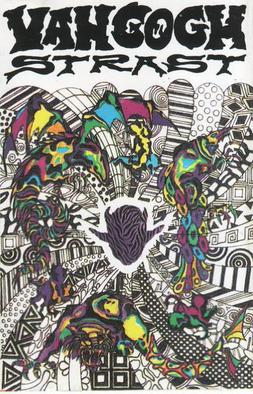
Strast is the third studio album from Serbian rock band Van Gogh, released 1993.
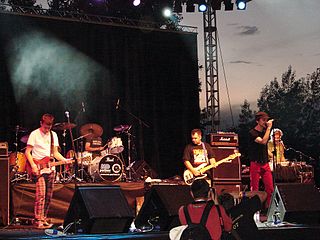
Obojeni Program is a Serbian alternative rock band from Novi Sad. The band are pioneers of the Serbian alternative rock scene. The first letters of the band's first seven studio albums form an acronym of their home town. They have performed at every Exit festival since the first in 2000, with the exception of the virtual Exit held in September 2020.
Negative is a Serbian rock band formed in Belgrade in 1999. Fronted by vocalist Ivana Peters, the band enjoyed large popularity and was one of the most notable acts of the Serbian rock scene during the 2000s.
Aleksandar Makedonski was a Macedonian and former Yugoslav rock band.

Tri posleratna druga is the sixth studio album released by Serbian and former Yugoslav singer-songwriter Đorđe Balašević.

Novembar is a Serbian punk rock band from Niš.

Godina sirotinjske zabave is the second album by the Serbian alternative rock band Block Out, released by Metropolis Records in 1996. The album was rereleased by Multimedia records in 2004.
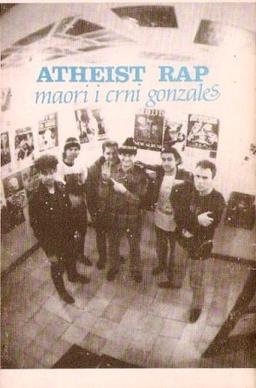
Maori i Crni Gonzales is the debut album by the Serbian punk rock band Atheist Rap, released by Scorned Records in 1993. The album, previously available only on compact cassette, was rereleased by Take It Or Leave It Records, featuring bonus material.

Ja eventualno bih ako njega eliminišete is the second studio album by the Serbian punk rock band Atheist Rap, released by PGP-RTS in 1995. The album, previously available only on compact cassette, was re-released by Hi-Fi Centar, featuring bonus material. The album title is an acronym for "jebanje" ("fucking")
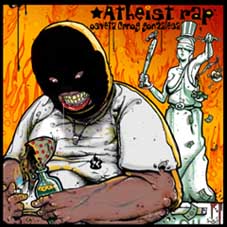
Osveta Crnog Gonzalesa is the fourth album by the Serbian punk rock band Atheist Rap, released by Multimedia Records in 2005.

Zubato Sunce is the second and last studio album by the Serbian rock band Džukele, released by Metropolis Records in 1998. As backing vocalists on the album appeared Atheist Rap, Goblini, and Generacija Bez Budućnosti members.

Priče matorih pokvarenjaka is the fifth album by the Serbian punk rock band Atheist Rap, released by the band themselves as a free download album, available at the Serbian official site of Converse as well as at the band's official site. During the first twenty four hours, the album was downloaded in 7500 copies. The limited edition of the album was released on CD with four bonus tracks under the SKCNS record label. The bonus tracks featured two cover versions, one The Ruts' "Something That I Said" and Pankrti track "Tko to mora biti zdaj", a rerecorded version of "Waltzer-eliminator" and the instrumental track "Vanredno stanje je redovno stanje".

Re Contra is the fourth studio album by the Serbian punk rock band Goblini, released by Metropolis Records in 1999.
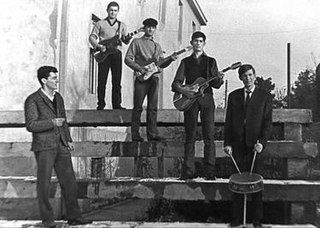
Bele Višnje was a Serbian and Yugoslav rock band formed in Čačak in 1962. Bele Višnje are notable for being one of the pioneers of the Yugoslav rock scene.

Boye were a Serbian and Yugoslav rock band formed in Novi Sad in 1981. Until the late 1980s, Boye were an all-female band, but later lineups also featured male members, with drummer Biljana Babić being the only mainstay member during the band's career. Initially a part of the Yugoslav new wave scene, Boye later moved towards garage rock-influenced alternative rock. The band released four studio albums before disbanding in 2000.

Moeto carstvo is the second and final album by Macedonian rock group Aleksandar Makedonski. It was released in 1996. Unlike their previous album, Za heroje i princeze, which was a Serbo-Croatian-language pop-rock album, Moeto carstvo is a Macedonian-language alternative rock album. This album can also be considered a Badmingtons album due to all three Badmingtons members appearing, with the addition of a rhythm guitarist and a bassist.
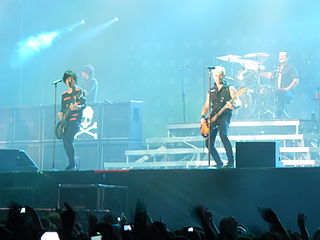
99 Revolutions Tour was a concert tour by American punk rock band Green Day in support of the band's trilogy, ¡Uno!, ¡Dos! and ¡Tré!, that took place in 2013. The tour was named after the song "99 Revolutions" from ¡Tré!.
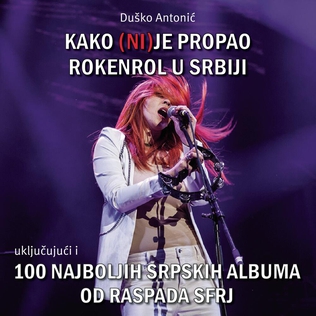
Kako (ni)je propao rokenrol u Srbiji is a book by Duško Antonić, published in 2021. The book features a number of Antonić's essays on Serbian rock scene, as well as a list of 100 best Serbian rock music albums published after the dissolution of SFR Yugoslavia. The list was formed according to the poll of 58 Serbian music journalists and critics, artists and others, similarly to the poll in the 1998 book YU 100: najbolji albumi jugoslovenske rok i pop muzike by Antonić and Danilo Štrbac.
This page is based on this
Wikipedia article Text is available under the
CC BY-SA 4.0 license; additional terms may apply.
Images, videos and audio are available under their respective licenses.


















